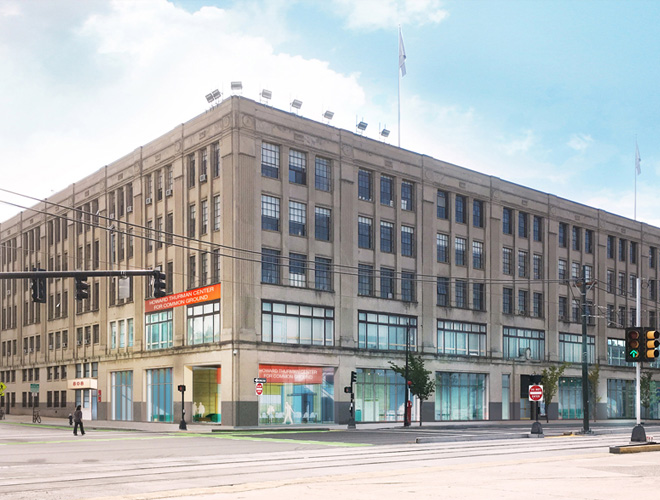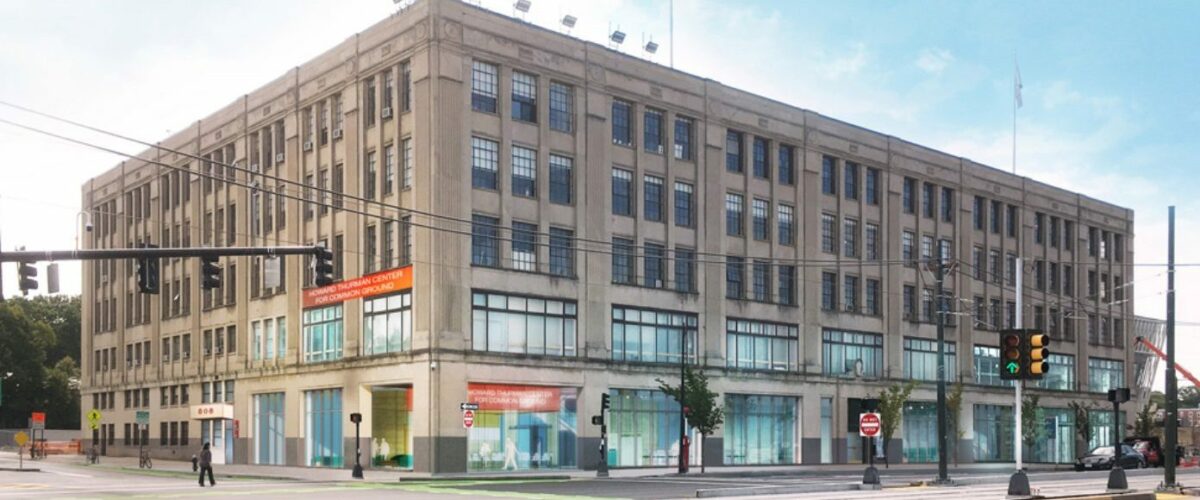About the HTC
Where It All Began
The Howard Thurman Center for Common Ground was founded by Dean Emeritus George K. Makechnie (Wheelock ’29, ’31, Hon.’79) in 1986 to preserve and share the legacy of Dr. Howard Thurman. Howard Thurman was a man of religion, a world-renowned educator, a philosopher and a poet, and Dean of Marsh Chapel at Boston University from 1953 to 1965. Thurman spent his life working to break barriers of divisiveness that separate people based on race, culture, religion, ethnicity, gender, and sexual identity.
Boston University’s Cultural Hub
The Thurman Center is Boston University’s cultural hub, and, unlike many colleges and universities that have separate Centers based on race, Boston University’s Howard Thurman Center does not. The Thurman Center is intentionally inclusive and emphasizes the importance of stepping outside your comfort zone to build relationships and share experiences with others. The Thurman Center is a place where cultural expression in all of its forms is embraced and encouraged.
The Search for Common Ground
Through an array of culturally based programs, lectures, discussions, films, events, and resources, the center spreads Thurman’s belief in the unity of all people and his philosophy of the Search for Common Ground. Howard Thurman believed the Search was a two-fold journey.
The first step is one of personal self-exploration. He would say:
“When you can go deep down inside yourself, really know who you are and are secure in who you are—then—you can find yourself in every other human being.”
The second step, he believed, is that:
“we all have as human beings to want to be with others—the desire to be part of a community.”
Thurman believed:
“…that meaningful and creative shared experiences shared between people can be more compelling than all of the faiths, fears, concepts, ideologies, and prejudices that divide; and if these experiences can be multiplied and sustained over a sufficient duration of time, then any barrier that separates one person from another can be undermined and eliminated.”
The continuous goal of the Thurman Center is to create a Living Common Ground Community on this campus. Students are invited to make the center their “home away from home,” while experiencing self-discovery through interaction with others. Using Thurman’s words, we advise:
“Don’t ask what the world needs. Ask what makes you come alive and go do it, because what the world needs is people who have come alive.”
The Centers of Influence
While the center’s philosophy and work are founded on the legacy of Howard Thurman, it is also supported by the legacies of many great people—trailblazers like Anna Howard Shaw, who focused on the root causes of social injustice, poverty, and women’s suffrage in America. She was the first woman to graduate from BU’s School of Theology, in 1878. Later, concerned with sickness and physical healing, she was among the first women to graduate from Boston University’s School of Medicine in 1885.
Message of Nonviolence
The center is also influenced by Mohandas Gandhi of India, who led his country to its independence through the philosophy of Ahimsa—nonviolence. After his meeting with Gandhi in India in 1935, it was Howard Thurman who brought Gandhi’s message of nonviolence to the United States. Howard Thurman also instilled Gandhi’s philosophy of nonviolence in Dr. Martin Luther King, Jr., while King was a graduate student at Boston University. And, the center’s work is certainly influenced by Dr. Martin Luther King, Jr., the drum major for freedom and human rights for all, who used Gandhi’s nonviolence philosophy and Thurman’s unity message to drive the American Civil Rights Movement. These legacies and countless others inspire the programs, services, and resources of the Howard Thurman Center.
Student Ambassadors
The gems of the center are the Student Ambassadors. They are dedicated young people who are committed to Dr. Thurman’s legacy of breaking barriers and building community. They come from a variety of races, religions, cultures, and places. Formerly called the Associates in the Search for Common Ground, the name was changed to the Thurman Student Ambassadors in 2005 to give them a more contemporary and shorter name.
-
1968
Office of Minority Affairs serves as hub for university’s culturally and ethnically diverse student community. -
1983
An informal Howard Thurman Fellowship was created by Dean Emeritus George Makechnie. It presented commemorative programs to the University and the Boston community at large. -
1984
Dean George Makechnie founds HTC Fellowship. -
1984
The Howard Thurman Archive was given to Boston University by his widow, Sue Bailey.
-
1986
HTC Fellowship becomes the Howard Thurman Center for Common Ground (HTC). It adopted the Fellowship and coordinated Thurman-related activities on campus. It also offered outreach programs for inmates at Norfolk State Prison for men (MCI-Norfolk) and Framingham State Prison for women (MCI-Framingham). The center provided these institutions with books and audio and video equipment. -
1991
Office of Minority Affairs renamed to Office of Multicultural Affairs (OMA).
-
1993
Student leaders in the Thurman Center proposed the creation of a student organization that would reflect the Thurman legacy and deal with contemporary issues affecting group relations. They were called Associates in the Search for Common Ground. -
January 2000
Howard Thurman Center for Common Ground becomes a department under the Office of Dean of Students and the first paid Director was appointed. -
2003
The Howard Thurman Center for Common Ground moved to the fourth floor of the George Sherman Student Union. -
2004
OMA programs enhanced and expanded through the Howard Thurman Center for Common Ground. The staff increased to three members with the hire of an assistant director and administrative secretary. -
2005
The Howard Thurman Center for Common Ground moved to its current location to the lower level of the George Sherman Union. The Center obtained a large, open space and several meeting rooms, including the Dr. Martin Luther King, Jr. Reading Room and the George Makechnie Meeting Room. -
2005
The name Associates in the Search for Common Ground was changed to the Thurman Student Ambassadors to give them a more contemporary and shorter name. -
2005
Boston University created an undergraduate scholarship in honor of one of its greatest alums, Dr. Martin Luther King, Jr. that lasted through 2011. The Martin Luther King, Jr., Scholars are also an important student component of the center. They, like the Student Ambassadors, are committed young people who have a strong sense of community and strive to make a difference in the world. Howard Thurman continually counseled: You must stay true to your own identity. You must be “at home [intimately at home] somewhere, in order to be at home [comfortably at home] everywhere.” -
December 2, 2015
President Brown and Provost Morrison form committee of students, staff, and faculty to propose an expanded and more visible Howard Thurman Center for Common Ground that can be a place to enhance the inclusive community we all desire. -
January 2016
A survey was sent, via email, to the Boston University community and followed by Community Listening sessions. -
March 27, 2016
Report of the Howard Thurman Center Vision Committee: Re-Envisioning the Howard Thurman Center for Common Ground is finalized. -
September 1, 2016
Increase in recurring budget for the Howard Thurman Center for Common Ground. -
September 19, 2016
University Provost Morrison appoints the Howard Thurman Space Program Committee and tasks it with drafting a set of recommendations that ensures the new design is consistent with the concept articulated by the Howard Thurman Center Vision Committee. -
April 2017
Report of the Howard Thurman Space Program Committee issued. -
May 2, 2017
Began evaluating potential sites for best possible location for a new Howard Thurman Center for Common Ground. -
Jan-May 2017
Hired new additional staff members to expand the reach of the Howard Thurman Center. -
November 2017
Announce to the community that the Howard Thurman Center for Common Ground will be relocated to 808 Commonwealth Avenue.
